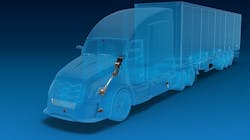ADAS adoption is worth exploring for safety's sake
I’ve been seeing a lot in the news lately about advanced driver assistance systems (ADAS).
On one hand, the National Transportation Safety Board‘s (NTSB) 2021 Most Wanted List includes a wish to require collision avoidance and connected vehicle technologies on all vehicles. According to NTSB, “A large percentage of highway crashes are caused by distracted or inattentive drivers. Collision-avoidance and connected-vehicle technologies can address the human error that can lead to crashes-saving thousands of lives on the nation’s roads.”
The agency specifically referred to things like forwarding collision warning and automatic emergency braking because they can warn drivers of upcoming hazards and also can act in the event the driver fails to take action based on the warning.
On the other hand, during a session at the recent Technology & Maintenance Council meeting, we learned that fleets have been slow to adopt ADAS. During the session, the American Transportation Research Institute’s senior vice president Dan Murray explained that fleets and drivers say they are concerned that driver control will be compromised if ADAS is installed on a vehicle. Murray believes this is a result of a misunderstanding of how the systems work. There is also concern over cost and maintenance of the systems.
Far be it for me to tell you what types of technology to invest in for your fleet; every fleet owner has to make that decision for themselves. What I will do is encourage you to investigate these systems so that you understand what they can and can’t do, how they operate, and their benefits and challenges. Once your research is complete you can make an informed decision about whether to spec ADAS on your vehicles.
I want to add a couple of additional thoughts: ADAS is not a substitute for good driving. The systems are designed — as the name implies — to assist drivers not to take their place. The systems warn drivers about upcoming hazards so the driver can take the appropriate action. They only intervene when the driver fails to take action to avoid a collision. Even if you invest in ADAS, you still need drivers to focus on the road and you need strong policies concerning distracted driving.
The goal is to avoid having to have the system emit warnings in the first place because your drivers are already driving safely. But we know that many crashes involving trucks are the result of a passenger car cutting in too close to the front of the truck. In those instances, ADAS can be a big help.
As for the concern over the cost of these systems, I will say this: what is the cost of one accident? Given the large verdicts that some juries have been awarding plaintiffs in crashes involving heavy-duty vehicles, it seems to me you might want to at least consider a system that could help you avoid an accident altogether. As you evaluate your investment in ADAS, confer with your insurance carrier as there may be some insurance savings attributable to equipping your vehicles with these systems.
To help you in your efforts to get educated on ADAS, the Federal Motor Carrier Safety Administration has videos and brochures that explain how the systems operate and look at return on investment. Consider checking those out on the agency’s website.
Like I said, I can’t tell you whether to invest in ADAS or not, but I sure think it is worth your time to learn more about them. After all, I think we all can agree that making our trucks and drivers safer on the road is a top priority.
About the Author
Joseph Evangelist
Joseph Evangelist previously served as EVP for Transervice, president of LLT International Inc., and CEO of Lend Lease Trucks Inc. Evangelist is a seasoned transportation executive with domestic and international experience in sales, operations, mergers, and acquisitions.
